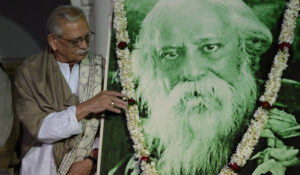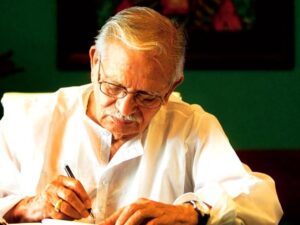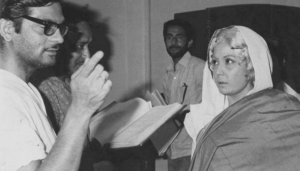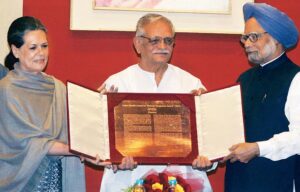थोड़ा सा रफू करके देखिए ना
फिर से नई सी लगेगी जिंदगी ही तो है
The creator of a straightforward yet stunning work of art, and whose name has continued to rule millions of hearts for generations. He is an author, filmmaker, lyricist, and poet who has received praise from all over the world and enthralled India with his talent. His lyrics demonstrate the long-standing reciprocal inspiration between poetry and music, and his poems are so exquisitely written that everybody who reads them is moved by their profundity. The life of Gulzar Sahab, a writer who understands the nuances of using words is worth a discussion.
रोज़ रोज आंखों तले, एक ही, सपना चले, रात भर काजल जले आंख में जिस तरह ख्वाब का दिया जले
Early Days and Influences
 Sampuran Singh Kalra, aka Gulzar, was born on August 18, 1934, in Dina village, Jhelum district, undivided India, now in Pakistan, and is well known for being the “birthplace of Gulzar, the author from India.” His father, Makhan Singh, had a modest company. When Gulzar was a baby, his mother passed away, and his stepmother did not care for him well. Gulzar consequently spent the majority of his time in his father’s store. Although he struggled academically and failed, he discovered his love for literature. He developed a close relationship with his favourite writers, Sharat Chand and Rabindranath Tagore, from an early age.
Sampuran Singh Kalra, aka Gulzar, was born on August 18, 1934, in Dina village, Jhelum district, undivided India, now in Pakistan, and is well known for being the “birthplace of Gulzar, the author from India.” His father, Makhan Singh, had a modest company. When Gulzar was a baby, his mother passed away, and his stepmother did not care for him well. Gulzar consequently spent the majority of his time in his father’s store. Although he struggled academically and failed, he discovered his love for literature. He developed a close relationship with his favourite writers, Sharat Chand and Rabindranath Tagore, from an early age.
लगता है जिंदगी कुछ खफा है, चलिए छोड़िए कौन सी पहली दफा है
His Fondness for Writing
While Gulzar was still a young child and attending school in Delhi, his love and enthusiasm for literature, poetry, and Shayari began to boil. He took part in Shayari competitions. Shortly after, he chose the pen name Gulzar, which translates to “rose garden.”
 He was in awe of Tagore at the age of ten through an Urdu translation of “The Gardener” and fell in love with his poetry right away. Gulzar has read a multitude of books since initially coming across Tagore, and he credits Tagore as being one of his biggest inspirations. Even Tagore’s own translations, in his opinion, do not do his original Bengali writings credit. With Bengali classmates at school and a Bengali wife later in life, Gulzar’s interest in Bangla increased
He was in awe of Tagore at the age of ten through an Urdu translation of “The Gardener” and fell in love with his poetry right away. Gulzar has read a multitude of books since initially coming across Tagore, and he credits Tagore as being one of his biggest inspirations. Even Tagore’s own translations, in his opinion, do not do his original Bengali writings credit. With Bengali classmates at school and a Bengali wife later in life, Gulzar’s interest in Bangla increased
दिल में कुछ जलता है शायद धुआं धुआं सा लगता है|
आंख में कुछ चुभता है शायद सपना कोई सुलगता है|
Works that won him accolades
It would be challenging to choose just a few of Gulzar Sahab’s works because he is such a magnificent writer. His works are regarded as the foundation of Indian film. Years after it was written, his writings still evokes a charming sense. Let’s take a look at some of his best pieces that brought him laurels.
As a Poet: Gulzar is well-known in the Urdu poetry community. Several Indian languages have seen his poems translated. A few books like Raat Pashmine Ki (Urdu and Hindi), Triveni (Urdu and Hindi), Chand Pukhraj Ka (Urdu), Kuch Aur Nazme (Hindi), Jaanam, etc. feature some of his finest poems.
 As a Lyricist: Gulzar Sahab is passionate about both music and art. For nearly six decades, his lyrics have enhanced the enchantment and significance of Bollywood films and songs. He has collaborated with numerous generations of filmmakers, music directors, and actors since he began his career as a lyricist in 1963. He has written the lyrics for some of the most well-known and timeless Bollywood songs and is also a master dialogue writer. His songs that gained him fame include:
As a Lyricist: Gulzar Sahab is passionate about both music and art. For nearly six decades, his lyrics have enhanced the enchantment and significance of Bollywood films and songs. He has collaborated with numerous generations of filmmakers, music directors, and actors since he began his career as a lyricist in 1963. He has written the lyrics for some of the most well-known and timeless Bollywood songs and is also a master dialogue writer. His songs that gained him fame include:
Film “Khamoshi”(1969)-
हमने देखी है उन आँखों की महकती खुशबू,
हाथ से छू के इसे रिश्तों का इल्ज़ाम ना दो।
सिर्फ एहसास है ये रूह से महसुस करो,
प्यार को प्यार ही रहने दो कोई नाम ना दो।
Film “Aandhi”(1975)-
तेरे बिना जिंदगी से कोई, शिकवा तो नहीं
तेरे बिना जिंदगी भी लेकिन जिंदगी नहीं
Film “Dil se”(1998)-
वो यार है जो ख़ुशबू की तरह, जिसकी ज़ुबान उर्दू की तरह,
मेरी शामो-रात मेरी कायनात वो यार मेरा सैंया
Apart from these, he has written songs for various films such as “Aashirwad (1968),” “Mere Apne (1971),” “Namak Haraam (1973),” “Khubsoorat (1980),” “Rudaali (1993),” “Slumdog Millionaire (2008),” “Raajneeti (2010),” “Jab Tak Hai Jaan (2012),” “Raazi (2018),” “The Sky is Pink (2019),” and many more.
 As a Director: “Aandhi” is conceivably among Gulzar’s finest films till date. Additionally, he created “Mirza Ghalib,” a TV series that has become a classic and one of their greatest works. He has directed other fantastic films, like “Angoor,” “Parichay,” “Koshish,” and “Namkeen.”
As a Director: “Aandhi” is conceivably among Gulzar’s finest films till date. Additionally, he created “Mirza Ghalib,” a TV series that has become a classic and one of their greatest works. He has directed other fantastic films, like “Angoor,” “Parichay,” “Koshish,” and “Namkeen.”
Nevertheless, after “Hu tu tu” (1999), he stopped making films because, according to speculations, the movie’s producer had numerous parts Gulzar Sahab intended to keep were chopped during the editing. Gulzar Sahab became disillusioned with the system as a result of not having the last say in the scenes or writing.
Awards and Recognitions
- 1972: Best Screenplay for the movie “Koshish”
- 2004: Padma Bhushan
- 2008: Academy Award for the song “Jai Ho” from the movie “Slumdog Millionaire”
- 2010: Grammy Awards for the song “Jai Ho” from the movie “Slumdog Millionaire”
- 2013: Dadasaheb Phalke Award
- Accompanied by many other National and Filmfare Awards.
He is the most sought-after lyricist and poet in India known for the beauty of his sentences and the power of his imagination. His unparalleled writing captures your spirit and penetrates to the very core of your being. The writing of Gulzar Sahab has such beauty. His melodies, experiences, and fantasies have become priceless mements of the past. They have been with all of us since childhood to adulthood. We hold them close while we make our way through a mystifying world as an adult.
जायका अलग है मेरे लफ्जों का,
कोई समझ नहीं पाता कोई भुला नहीं पाता।






